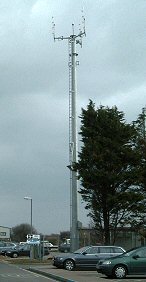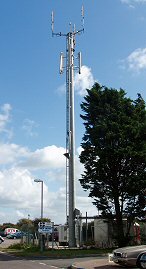


   |
TETRA: the national picture for the O2 Airwave system |
|||
|
How did it happen and with what outcomes? |
TETRA: an illegal contract and unnecessary expense? Or just a white elephant? TETRA stands for TErrestrial Trunked RAdio. It is the new national police radio system, operated mainly by O2 under the brand name of Airwave. Planned since early 1990, the contract was given in March 2000 to BT and Motorola, without going to tender. Since that time, BT has split its business and the Airwave contract went to the section of the company that deals with mobile networks. This was initially called O2, then mmO2, and now back to O2. However, since the contract was awarded, the European Commission has found the British Government guilty of unlawfully limiting the contract to tender to TETRA systems only and in our opinion guaranteeing the contract to O2. The existing contract is unlawful as it contravenes European competition laws as defined in the treaty of Rome. With Airwave in place, of course, the market is opened up to O2. Here are the invited parties (see sharers list at the bottom of the linked page), all potentially sharing the same 3,700 masts. Airwave is billed as ‘HMG Critical National Infrastructure’. Read carefully: Airwave is to carry voice and data without the aid of conventional mobile and fixed telephony. Did you know, this emergency services system that we have paid for is also being offered under contract to other ‘public safety agencies’ – including Sheffield City Council Parking Services ... Yes, we paid for Airwave, we pay the Council, and the Council pays Airwave to use what we paid for! Here is a list from 2003 of the potential users of Airwave (quite a cash cow isn’t it, after we’ve paid for it to be installed, in taxes?). Start ticking them off...
‘Will the Commission state what EU legislation on procurement should apply to the purchasing of the Tetra system by the United Kingdom for communications use of its police forces? Is the Commission satisfied that the UK government complied with the relevant provisions in letting this contract?’ The official line is that Tetrapol dropped out of the running during the tendering process. This is untrue. Tetrapol was excluded, leaving only BT (pre mmO2) to tender.
Beware of this myth: ‘Airwave is a national police contract.’ It is not. The contract is between the Home Office and O2 Airwave. Each police authority can decide for itself what system to adopt for its emergency communications. Beware of this myth: ‘TETRA is THE (only/preferred) European standard.’ Since 1996, the TETRAPOL Standard was recognised by the vast majority of the European and International bodies such as the International Telecommunication Union; CEPT; European Police Co-operation Council; ETSI Board (in March 1999 ETSI accepted the Tetrapol Publicly Available Specification – TETRAPOL is fully compliant with the ETSI Technical Specifications [ETS]); and The Radio Communication Agency. As a matter of fact, 70% of the European digital PMR market is using the Tetrapol standard, and the largest PMR nationwide networks adopted Tetrapol, making it a tried, trusted and proven technology. Beware of this myth: ‘Stopping TETRA compromises the safety of the public’ (and similar phrases, ‘is against the public interest’, ‘is against national security’). No. It is for the Home Office and Police Authorities to equip themselves appropriately to do the job we pay them to do. The wrong kind of truncheon/baton, the wrong kind of police car, the wrong kind of radio system: all are the same kind of decision. The wrong choice of equipment is something we should all be free to challenge. Beware of this myth: ‘Airwave is vital for getting your ambulance on time.’ Firstly, Airwave is not being used by ambulance trusts to improve arrival-to-scene performance. A few are using the network to prove IP-protocol links to PDAs (ie linking handheld computers to the Internet for file transfer, like this website) which is not using the Airwave TETRA data protocol, or voice, as the police are. Beware of this myth: ‘TETRA helped at the Madrid bombings and the Olympic games.’ Spain used Tetrapol. The limited use of TETRA handsets (not a TETRA network) in Madrid proved so unreliable that TETRA is unlikely ever to be considered again. At the Olymics there is no network, only TETRA handsets used as walkie-talkies. Beware of this myth: ‘TETRA provides ultimate security from criminals and terrorists through end-to-end encryption.’ The only true security is the same as mobile phones; the signal is digital. Transmissions between masts are not encrypted. Too often, police authorities and O2 Airwave have directly and openly implied that were a prospective landlord to refuse a TETRA mast, they would be unable to police them. Blackmail? Well, certainly not an appropriate approach by our police forces. Gittisham is the Devon village that was to be sold off by the landowner/lord until a major publicity campaign by local residents made him think again. The locals are now fighting a TETRA proposal. They report: ‘O2 have told the landowner that he could be prosecuted by villagers if someone died amidst a ‘disaster’ situation made difficult by the absence of a mast.’ Outcome? Mast refused because of health fears, and because the mast was not necessary anyway. What will it cost YOU?The TETRA Airwave system is a Home Office initiative being rolled out throughout the UK. TETRA will cost in excess of £3 billion to put in place, which is double the original estimate and we expect these costs to continue to spiral. The cost of the system is in sharp contrast to the French Police system which has the same functionality and services to Tetra but which was nationally implemented for the lowly sum of £300 million. In the initial bids, TETRA was seven times as much as Tetrapol, which was accepted and required fewer masts. Initially, police forces were reluctant to adopt TETRA, believing it to be old technology, untested and not good Value For Money. It was decided to offer £500 million to be divided between 54 police forces in order to kick start the process of implementation and encourage the police to accept it. This works out at less than £10 million per force. (If a force did not take TETRA, it would receive no part of this funding.) Sussex, for example, has received around £7 million, to cover initial rollout and the first year’s costs. The cost of equipment (handsets are £800 to £1,000 each and there are 3,300 police in Sussex), and the cost of coverage outside the 16 per cent ‘core’ coverage of the system in Sussex would be extra. Running costs will include mast rental, maintenance, equipment replacement and additional ‘modules’ to include data transfer, and enhanced coverage by adding more masts, more aerials on masts and/or increased power output to increase capacity.
This would be a burden on the Council Tax Payer, quite aside from the additional threat to health. Where the police precept (their part of your council tax bill) is due to be increased for normal operational requirements, the increased burden of Tetra would require additional funding and consequent increase in the precept. This would still not guarantee the required coverage nor meet the operational specifications of the system. This is why some police authorities have chosen to use alternative communications methods. It comes down to how much you get for your money. Without the extra expenditure, the Airwave system will do no more for the police than ordinary mobile phones (what did you pay for yours?). If the people of each police authority were made fully aware of the cost of Tetra over the 15 years of its contract with Airwave, and its shortcomings, the average Council Tax Payer would be horrified. It must be stressed that when Airwave tell the press that it is a £2.9 billion contract, and try to give the impression that this sum will come from central government, this is not true. The minimum value of the contract across the country is £2.9 billion, and most of it will be borne by Council Tax Payers. While Councils are trying to reduce costs, the cost of TETRA can only be an estimate and will quickly be seen to be out of control. What we learnt was that it would be illegal to use the first generation TETRA handsets, as early as 2005, since only second generation units will be technically compliant. Some forces have already bought their first replacements (£800 upwards per handset) with our Council Tax. Yet the complaint about VHF radios was that they were so old they were patched up with sticky tape! Councillors would be wise to oppose use of Airwave for its impact on Council Tax alone. How committed is anyone?The government now claims to be committed to the Tetra system. It is widely believed that the Government has made £billions by selling off the original police channels to mobile phone companies and therefore have no services to fall back on. Mast Sanity do not believe this is the complete truth; however, if the government accepted that Tetra was a danger, then it is likely that Tetra base stations could be changed into other systems base stations relatively easily, by changing a few electronic and software modules. Controversy has clearly followed Tetra since its inception, with questions raised about the choice of the system, the untried and unknown nature of the technology and the numerous health issues. The Public Accounts Committee (Nov 2002) concluded that: ‘Airwave might be more sophisticated and expensive than it really needs to be ... It is significant that individual police authorities and the fire service cited the cost of Airwave as their reason for being unwilling to subscribe to it ... The remedies available to the Home Office if the system does not work will not fully compensate police forces for the disruption and operational risks that would inevitably follow.’ The contract was to have the system in place by the end of 2005. It was – almost. But as the last few masts are going through planning in Scotland in 2006, so Airwave is talking of removing perhaps 140 as not required! Our aimWe are saying NO to TETRA. We are suffering from its health effects, and we are set on a course to suffer from its cost effects. But we are not just fighting for local reasons. We recognise the national importance of the issues, and hope we can make a significant contribution well beyond the departure of our own masts.
|
 TETRA at Shoreham Airport. Gives many people a headache just standing under it. Why?
TETRA at Shoreham Airport. Gives many people a headache just standing under it. Why?Below: O2 has capitalised on Airwave site procurement by selling space on to other operators. Welcome to Vodafone. 
|
|
Home | |||